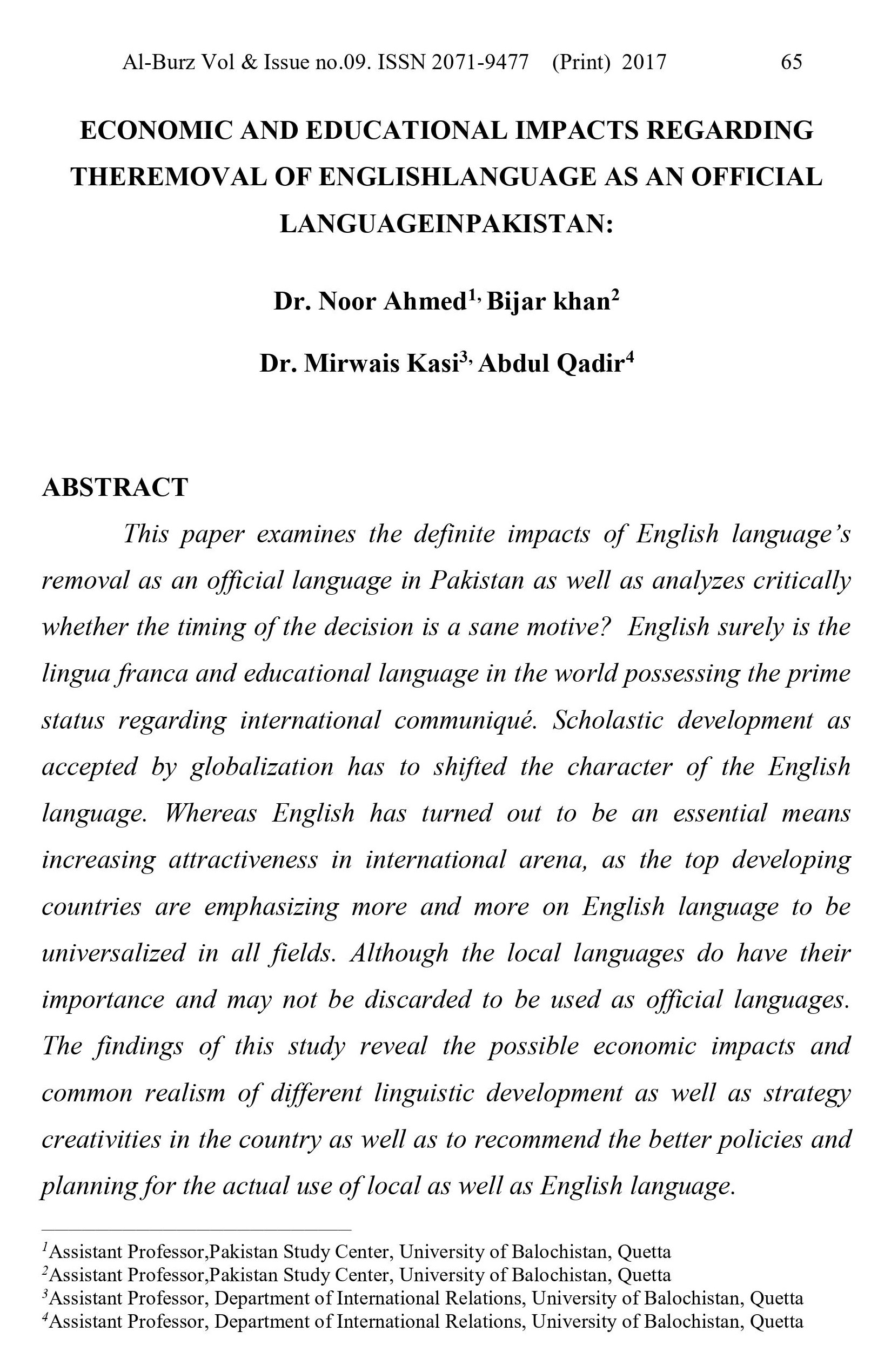ECONOMIC AND EDUCATIONAL IMPACTS REGARDING THEREMOVAL OF ENGLISHLANGUAGE AS AN OFFICIAL LANGUAGEINPAKISTAN:
DOI:
https://doi.org/10.54781/abz.v9i1.104Abstract
This paper examines the definite impacts of English language’s removal as an official language in Pakistan as well as analyzes critically whether the timing of the decision is a sane motive? English surely is the lingua franca and educational language in the world possessing the prime status regarding international communiqué. Scholastic development as accepted by globalization has to shifted the character of the English language. Whereas English has turned out to be an essential means increasing attractiveness in international arena, as the top developing countries are emphasizing more and more on English language to be universalized in all fields. Although the local languages do have their importance and may not be discarded to be used as official languages. The findings of this study reveal the possible economic impacts and common realism of different linguistic development as well as strategy creativities in the country as well as to recommend the better policies and planning for the actual use of local as well as English language.
References
Alia Amir, Chronicles of the English Language in Pakistan: (1 December 2008), A discourse analysis of milestones in the language policy of Pakistan. P. 5
Replacing English with Urdu as Official Language in Pakistan: 21st Century and English as InternationalLanguage,
(September, 30 2015) Retrieved on August 27, 2015 https://publish.illinois.edu/sswpolicy/author/kwegmannillinois-edu/
SairaIjaz Ahmed, Issues of Medium of Instruction in Pakistan. (1 January, 2011)International Journal of Social Sciences and Education Volume: 1
Baluchistan Education Census (2005), Academy of Education Planning and Management, Ministry of Education, Islamabad, Pakistan.
Government of Pakistan. (1947).The First Education Conference 1947, Karachi: Ministry of Education.
Government of Pakistan. (1959).Report of the Commission of National Education, Karachi: Ministry of Education.
Government of Pakistan. (1970).The New Education Policy, Islamabad: Ministry of Education.
Government of Pakistan. (1972).The Education Policy 1972-80, Islamabad: Ministry of ducation.
Government of Pakistan.Constitution of Pakistan. (1973)
Government of Pakistan.(1979).The National Education Policy and Implementation. Program, Islamabad: Ministry of Education.
Govt. of Pakistan, (1984).1981 Census report of Pakistan. Population Census Organization, Statistics Division, Govt. of Pakistan, Islamabad.
Khan S.B (2009) Ezhar-i-Bayan Ki Quwat, Urdu BehtarYa English, Akhbar-i-Urdu. MuqtidraQuamiZaban, Islamabad.
McArthur T., (1998). Official Language, Concise Oxford Companion to the English Language, Ed. Oxford University Press.
Mukhtar, E. (1999). Basic Education in Pakistan. Islamabad: UNESCO.
National Education Census (2005), Academy of Education Planning and Management, Ministry of Education, Islamabad, Pakistan.
NWFP Education Census (2005), Academy of Education Planning and Management, Ministry of Education, Islamabad, Pakistan.
Punjab Education Census (2005), Academy of Education Planning and Management, Ministry of Education, Islamabad, Pakistan.
Sindh Education Census (2005), Academy of Education Planning and Management, Ministry of Education, Islamabad, Pakistan.
Tariq R. (1999). Language, Education, and Culture.Oxford University Press.
Malcolm Gladwell (2000). The Tipping Point: How Little Things Can Make A Big Difference, New York: Little Brown.
Schloss Bellevue, Berlin, 22 February 2013.
Economist Intelligence Unit (2012). Competing across borders: How cultural and communication barriers affect business.
THES: www.timeshighereducation.co.uk/world-university-rankings
The Times, 22 May 2013 ‘Use of English in French universities is a cause célèbre’.
David Crystal (2003) English as a Global Language.Cambridge University Press.
The English Effect, The impact of English, what its worth to the UK and why it matters to the world. Retrieved from www.britishcouncil.org

Downloads
Published
How to Cite
Issue
Section
License
Copyright (c) 2017 Authors who publish with Al-Burz journal agree to the following terms: 1. Authors retain copyright and grant the journal right of first publication with the work simultaneously licensed under a Creative Commons Attribution (CC-BY) License that allows others to share the work with an acknowledgement of the work's authorship and initial publication in this journal. 2. Authors are able to enter into separate, additional contractual arrangements for the nonexclusive distribution of the journal's published version of the work (e.g., post it to an institutional repository or publish it in a book), with an acknowledgement of its initial publication in this journal.

This work is licensed under a Creative Commons Attribution-NonCommercial-ShareAlike 4.0 International License.
Alburz has licensed under a CC Attribution-NonCommercial-ShareAlike 4.0



